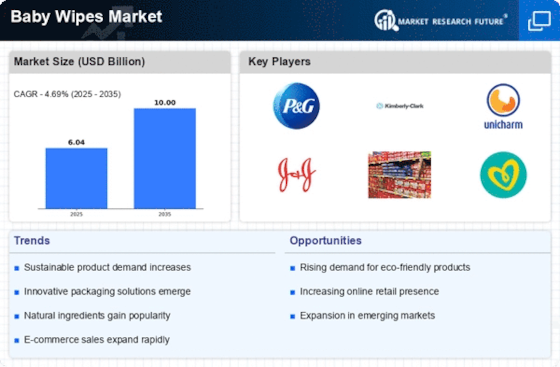Top Industry Leaders in the Baby Wipes Market

Market share analysis in the baby wipes segment is influenced by crucial factors such as product quality, hypoallergenic formulations, and the ability to cater to various consumer needs, including sensitive skin and environmental concerns. Pricing strategies play a pivotal role, with companies offering baby wipes across different price points to address diverse consumer budgets. Establishing strong partnerships with retailers, both in-store and online, is essential for market share, ensuring the availability and accessibility of baby wipes to a broad consumer base.
While established players dominate the baby wipes market, new and emerging companies are entering the sector with innovative approaches. These entrants often focus on natural and organic formulations, biodegradable materials, and specific niche markets to differentiate themselves. The agility of these emerging companies allows them to swiftly adapt to changing consumer preferences, challenging the market dominance of established brands and contributing to the overall diversity of the market.
Industry news within the baby wipes market frequently highlights product advancements, collaborations, and evolving consumer trends. Companies regularly introduce new features such as fragrance-free options, eco-friendly materials, and packaging innovations. Collaborations with parenting influencers, healthcare professionals, and baby care experts are common to enhance brand credibility and visibility. Regulatory updates related to safety standards, ingredient transparency, and environmental sustainability shape industry dynamics, prompting companies to adjust their formulations and practices accordingly.
Current trends in company investments within the baby wipes market reflect a notable focus on sustainability, technology integration, and digital marketing. Companies allocate resources to develop eco-friendly wipes, explore biodegradable and compostable materials, and adopt sustainable sourcing practices. Strategic marketing initiatives, including digital advertising, influencer partnerships, and social media campaigns, are employed to strengthen brand presence and resonate with the target consumer demographic. Investments in technology, such as smart packaging and online platforms for parenting advice and product recommendations, align with the growing demand for convenience and personalized parenting solutions.
The overall competitive scenario in the baby wipes market remains dynamic, with companies navigating evolving consumer preferences and sustainability expectations. Established players face the challenge of maintaining brand trust and relevance in a market where emerging companies are capitalizing on eco-friendly practices and innovative formulations. The competition is expected to intensify as new entrants gain recognition, introducing fresh features and challenging the market share of established brands. In this environment, adaptability, responsiveness to consumer trends, and a commitment to sustainability will be crucial for companies to maintain and enhance their competitive positions in the baby wipes market.
Industry News and Investment Landscape:
- Acquisitions recently made, such as Kimberly-Clark's acquisition of Sofidel, point to a trend of industry consolidation.
- A forward-thinking strategy is indicated by increased R&D expenditures that concentrate on eco-friendly materials, creative cleaning techniques, and clever packaging.
- Baby wipes are becoming more and more popular as a necessary cleaning product as people's awareness of hygiene issues has grown, particularly during the epidemic.
Key Companies in the Baby Wipes Market include –
- Kimberly Clark Corporation
- J.C. Johnson & Son
- Procter & Gamble
- Unicharm Corporation
- Bodywise Limited
- Seventh Generation Inc.
- The Aldo Group Inc.
- D&G Laboratories Inc.
- Irish Breeze UC
- The Honest Company, Inc.











